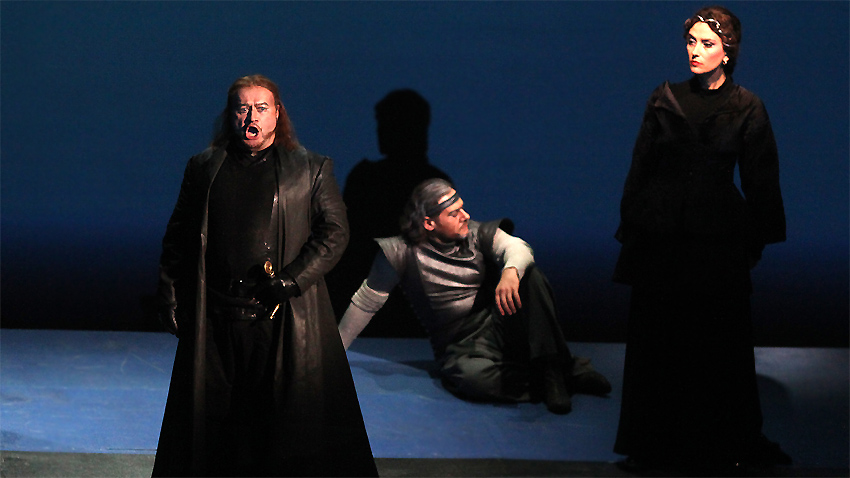Artistry and absolute singing mastery – that is what it takes to stage Wagnerian drama. The premiere opera in the programme of the Sofia Opera House is Tristan and Isolde on 26 February. “This is the work by Richard Wagner that defines his philosophy as a crowning impulse and as a revelation of the meaning of life with the insight that love is the only way to find one’s way”, says director Plamen Kartaloff. The project’s linguistic and stylistic consultant Richard Trimborn, Germany says:
“We started work in February – a year almost to the day. Unlike other works by Wagner the action is a bit slower, though this is compensated for by a broad panoply of inner emotions. This is in fact the challenge when one stages Tristan and Isolde. Compliments to the Sofia opera artistes who dedicated their talent, their enthusiasm and inspiration to look into and beyond the text. They did it in an admirable way and climbed their Everest.”

The opera staging has two conductors: Velizar Genchev who is well known to audiences in Bulgaria and Constantin Trinks from Germany. Since 2009 Constantin Trinks has been Chief Music Director of the Darmstadt State Theatre and has guest performed on many world stages:
“This is my first time in Sofia and I am very impressed by the Bulgarian performers’ depth of interpretation of the opera. Tristan and Isolde has never been staged in Bulgaria and that makes our job all the more responsible. I know that Wagner’s tetralogy The Ring of the Nibelung was a great success. I am happy to be able to work on Tristan and Isolde and to reap the fruit of the experience accumulated in the German style these past five years.”
Soprano Tsvetana Bandalovska in the role of Isolde is thrilled to be working with conductor Constantin Trinks. “It is so important to have a bond of trust and confidence between singer and conductor,” she says and admits this is the event of her career. Tsvetana Bandalovska:
“To my mind Tristan and Isolde is the opera of all operas because it conceals the mystery of the human soul. At the end Isolde is taken up to another dimension and flies off into a different kind of space. There are other creatures there, other lights – and the artist must exercise great control.”

Wagner’s Tristan and Isolde is very difficult to stage yet it is an amazing experience.
“The role of Isolde has been a dream of mine since my time at university and that was a long time ago. I am thankful to Plamen Kartaloff for helping me make it come true. The opera is wrapped in the magic of love. This is the eighth Wagner opera I have a major role in; obviously I am very fond of him.”
Music lovers from the Wagnerian societies in Germany have come to see Tristan and Isolde in Sofia. Sofia Opera Director Plamen Kartaloff says that he is extending its repertoire with a set purpose - so as to include German works alongside the Italian, French and Russian repertoire. “The next challenge we shall face is to take Wagner to Germany and we are already working on it," he says. “We are planning it for September in the heart of Bavaria, at a fantastic theatre in the town of Füssen.”
English version: Milena Daynova
On November 9, one of the halls of Trakia Ensemble in Plovdiv will host the traditional masterclass "With Kichka Savova’s Songs" . The event is organized by the Kichka Savova Foundation, chaired by Stefka Zdravkova, daughter of the renowned Thracian..
For thirty years now, Bulgarian violinist Iskrena Yordanova has been living in Lisbon. Everything she does as a musician is related to Baroque music. She has devoted much of her time to discovering ancient manuscripts, which she brings back to life with..
Kottarashky is one of the most intriguing musicians to have appeared on the Bulgarian music scene in the first decade of the 21 st century. The man behind the stage name is Nikola Gruev, and his work is an ongoing genre-blending experiment. He is..

+359 2 9336 661
